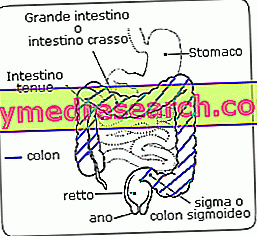What's this
Ulcerative colitis is a chronic inflammatory disease that affects the large intestine, first involving the rectum and eventually spreading to the whole colon. The typical symptoms are abdominal pain and diarrhea, often mixed with blood and mucous losses.

At present the ulcerative colitis knows neither a certain origin nor a definitive cure, but the available pharmacological therapies are able to reduce the symptoms and prevent their complications; in some cases the effectiveness is such as to favor even spontaneous remission in the long period of time.
Causes
Doctors do not yet know the exact cause of origin, although many hypotheses of the past have now fallen. Today we know, for example, that stress can no longer be considered the main culprit of the disease, although it can still encourage exacerbation as happens with psoriasis.
The most reliable hypotheses currently take into consideration the combination of immune theory and inheritance. Some researchers think that ulcerative colitis is caused by a virus or a bacterium, capable of triggering an exaggerated inflammatory response in the body, which in turn can alter the normal metabolism of the cells that make up the intestinal mucosa. Others believe that this alteration of the immune response is triggered by food, bacterial or autogenous allergens. The latter theory, based on the autoimmune etiology, is currently considered the most viable hypothesis.

There are therefore numerous hypotheses on the origin of ulcerative colitis, although for the moment none of them is able to provide concrete answers.
Risk factors
During the numerous studies that followed to investigate the causes of the disease, a number of risk factors also emerged, which somehow seem to predispose the patient to the development of the disease. These factors include age, with a greater risk under thirty and a secondary peak around the sixth decade of life, the more susceptible race is the white one, a diet rich in fats but low in fiber and, like mentioned, the familiarity with the pathology; there is also a slight predominance in women. Finally, an important risk factor could also be represented by a condition known as sclerosing cholangitis, in which there is an inflammation of the bile ducts which from the liver, the organ that produces bile, flow into the initial part of the small intestine. The two diseases are in fact often associated.
Symptoms
To learn more: Symptoms of ulcerative colitis
The symptoms of ulcerative colitis vary depending on the severity and location of the inflammatory process.

When observed on endoscopic examination, the mucosa of the rectum and more or less extensive parts of the colon has numerous point ulcerations, hence the term "ulcerative colitis". At an advanced stage, the small ulcers flow together, creating more or less extensive mucosal lesions. These small ulcerations, which cause the bleeding and discharge of mucus in the lumen of the intestine, are responsible for the classic symptoms associated with ulcerative colitis.



